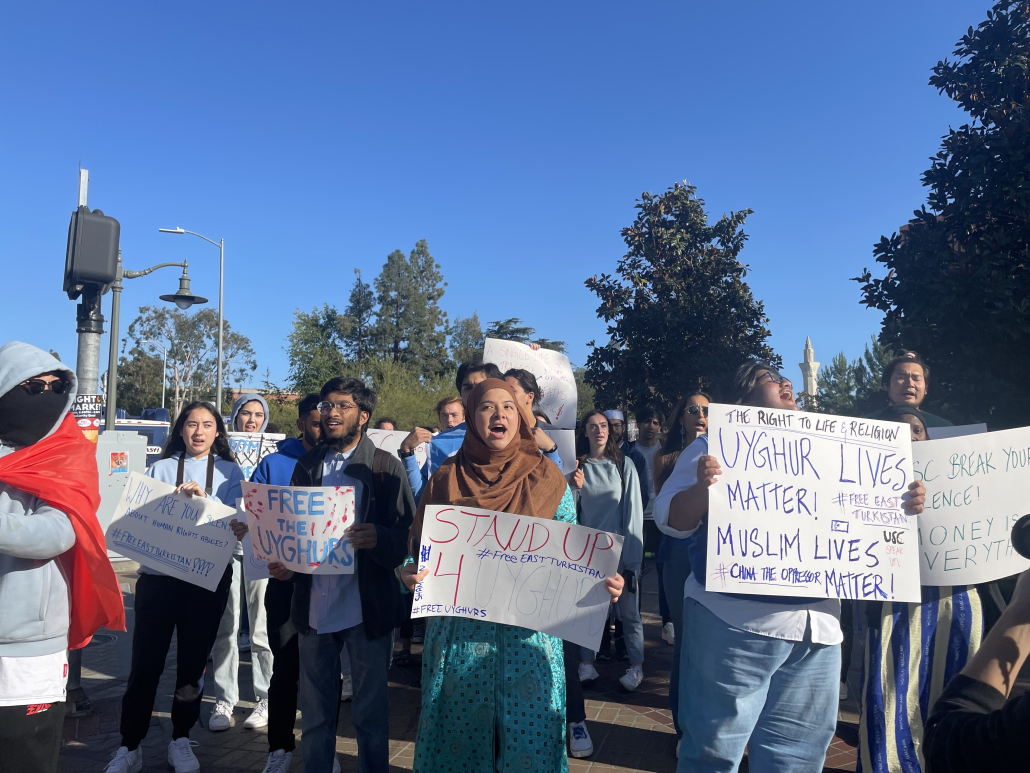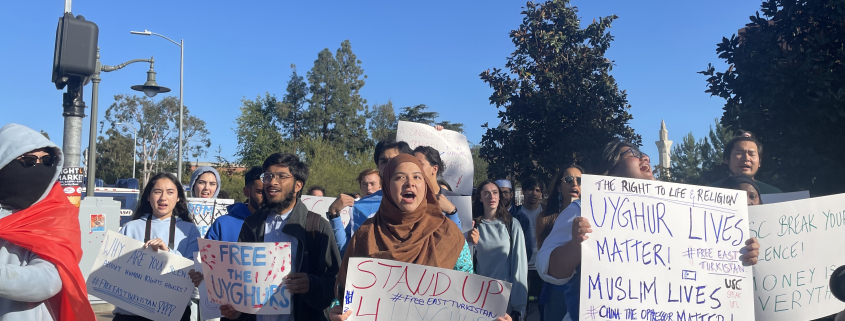Students seek Uyghur genocide recognition

Led by Ephar Anwar, students rallied Wednesday evening to chants of “USC break the silence,” “USC, hold China accountable” and “Free the Uyghurs,’ demanding the University recognize the Uyghur genocide in Chinese occupied East Turkistan. The protest started in front of the Ronald Tutor Campus Center, making its way through Trousdale Parkway and to the USC Village before entering campus again through McClintock Avenue and making its way back to RTCC.
“USC speaks up about almost every human right issue, but they never speak about the Uyghurs,” Anwar, a senior majoring in international relations, global business, said. “USC, stand for Uyghurs.”
Anwar serves as president of the Muslim Student Union, and said that more than 93 of her relatives have gone missing since China occupied East Turkistan and started operating detention camps for Uyghur people. Millions of Uyghurs have been detained and subjected to inhumane conditions, such as forced sterilizations, sexual assault, indoctrination and slave labor.
The University has not made any statements denouncing the genocide. While the USC US-China Institute informed the community about US-China relations and policy, they have not given much coverage to the Uyghur genocide, Anwar said.
“[Uyghur students] do not feel like USC cares about the genocide. We always say the notion ‘never again;’ however, we are letting it happen in our own eyes,” Anwar said. “Right now, it seems like USC is walking over the genocide, maybe because of economic ties, but we don’t know.”
Lula Haji, a sophomore majoring in political science and law, history, and culture who attended the protest, compared the lack of University response to the Uyghur crisis to the statement USC released earlier this semester in support of Ukrainian students.
“Evidently, the University has stances on these issues, and it’s about which issues USC chooses to prioritize,” Haji said. “It doesn’t seem like they’re prioritizing a clear human rights issue and a genocide that’s happening right now.”
Apart from issuing a statement in support of Uyghur students, the University could also offer trauma-specific mental health resources for students who are affected by the genocide, reconsider possible economic ties with Chinese corporations and create programs for East Turkistan and Uyghur studies, Anwar said.
Students can support their Uyghur peers by taking time to learn about the issue, attending protests that raise awareness, pressuring the University to divest from Chinese government funded institutes and boycot companies that use Uyghur forced labor, such as Nike, Zara and Gap.
Aimen Ahmed, a sophomore majoring in international relations and the global economy and geodesign, attended the protest because it is important for her to help bring awareness to the issue. She said it is easy for Americans to forget about human rights violations happening around the world, but actively attending demonstrations and protests helps to keep issues relevant and encourage people learning about the subject.
“People should do research and get to know more about what’s going on,” Ahmed said. “In America, we stress this individualism, but we as humans should care about what happens to other people, and we should be more selfless and try to learn more about what’s going on in the world.”
Mohammed Zain Shafi Khan, a freshman majoring in international relations, said he joined the protest because of the the various human rights violations that do not receive enough attention. He said students should use their freedom of speech to read about the genocide and speak up against it.
“If we don’t speak up, there’s no one to speak up for [detained Uyghurs] because they can’t speak up for themselves,” Khan said.
MSU held the Uyghur solidarity protest in collaboration with Delta Phi Epsilon, USC’s foreign service society. During their 2020 action week, DPE held a similar demonstration in support of Uyghurs, so MSU invited them to join today’s protest.
“I’m really grateful that MSU reached out to us, and we got to work with them on this because I think it’s definitely something that I’ve learned a lot from preparing for [the protest],” said Sydnee Yu, DPE’s humanitarian service coordinator.

